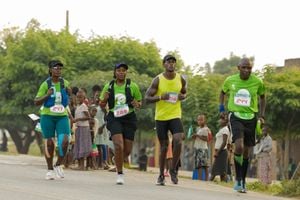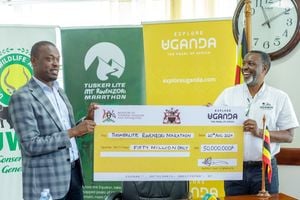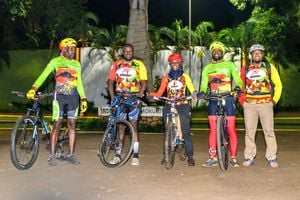
Participants take part in the 2024 Tusker Lite Mt Rwenzori Marathon in Kasese District on August 24. Photo | Courtesy of Rwenzori Marathon
The Mt Rwenzori Marathon held against the backdrop of the beautiful savannah woodland landscape and breathtaking Rwenzori Mountain ranges is having a positive economic impact on the hospitality industry in the host district of Kasese.
Sponsored by Uganda Breweries Limited (UBL) under its premium beer brand Tusker Lite, the annual running event offers participants a unique opportunity to engage in various race categories while experiencing the natural beauty and cultural richness of Uganda. Its first edition was held in 2022 and pulled in 800 participants.
The second edition in 2023 saw more than 2,000 participants from 17 nationalities turn up. The number soared to 3,700 participants from more than 30 nationalities this year, much to the joy of a burgeoning hotel and hospitality industry in Kasese.
On April 3, following a thorough assessment process led by Garvin Wright, an official from the World Athletics, three of the race courses on the Tusker Lite Mt Rwenzori Marathon were officially certified. The marathon will now be able to provide athletes worldwide with unparalleled opportunities to compete and set records on a course recognised worldwide.
This year’s edition—held on August 24—introduced a new 10km route, complementing the existing 5km, 21km, and 42km courses.
Abel Chelangat and Emily Chebet were crowned winners of the men’s and women’s 42km races respectively. Both received Shs10m apiece.
In the 21km half-marathon, Abel Chebet clinched victory in the men’s category, and Rebecca Chelangat triumphed in the women’s race, each securing a Shs7m cash prize
“When the first edition of the Tusker Lite Mt Rwenzori Marathon happened in September 2022, we as investors in the region, did not envision the impact it would bring to Kasese and its surroundings,” Dr John Henry Baguma, the secretary general of the Kasese Tourism Investors Forum (KTIF), wrote in an article this newspaper carried.
Mr Baguma said in 2022, Kasese had 63 accommodation facilities, offering 502 rooms, many of which were in a sorry state. “They have since been refurbished and there has also been a noticeable surge in new hotels. We currently have 182 accommodation facilities with a total of 2,806 gradable rooms.”
Godfrey Katongole, the general manager of Sandton Hotel Kasese, also noted that “more people are interested in the running and more are excited about it.” He adds that this has translated into more people booking services such as food, drinks and accommodation.
‘Catalyst of change’
Ashley Ngonzi, the manager of Leisure Pub, confirms that the marathon gives sales in bars, restaurants, hotel bookings and supermarkets a bump. “We estimate that the marathon has increased the sales at Leisure Pub from 20 to 30 percent.”
This perhaps explains why UBL opted to bankroll the running event. Andrew Kilonzo, the managing director of the brewer, says the marathon has, in many respects, become “a catalyst of change.” And there is empirical evidence to support the claim.
The Tourism Research and Development Centre (TRDC)—a leading tourism and hospitality research, planning and policy non-for-profit organisation in Uganda—partnered with Equator Hikes, the event organisers, to conduct the study to understand the impact of the marathon in Kasese, and Rwenzori Sub-region in general.
The study titled Insights and Economic Impacts of the 2023 Rwenzori Marathon sampled and interviewed 360 respondents during and after the 2023 edition. Of these, 42 percent were marathon participants; 33 percent were local businesses; 24 percent were accommodation facilities; and one percent were public and private sector leaders.
Of the sampled participant population, 96 percent were Ugandan nationals. Sixty-nine percent of these were male, majority of whom were from Kasese, Kampala, Mbarara and Wakiso districts. The participants were mainly youth i.e., 25-34 years (36 percent) and middle age i.e., 35-44 years (30 percent), with more than 60 percent of them educated up to university/tertiary level.
The study showed that 75 percent were attending the marathon for the first time and 30 percent had never visited Kasese before, having got information through social media (43 percent) and previous marathons attended (17 percent).
The majority (57 percent) travelled as individuals and mainly came by public means of transport (36 percent) and private cars (31 percent), but mainly used motorcycles/boda boda (32 percent) and private cars (31 percent) while in Kasese. The majority stayed in hotels (43 percent) and guest houses (28 percent), spending an average of one to three days.
Shs3.5b realised
The Rwenzori Marathon generated an estimated total direct expenditure of Shs3.5b, with approximately Shs1.9b spent by the companies and organisations who sponsored various components of the marathon. This means Shs1.6b was spent by the visitors and residents of Kasese during the marathon period.
On average, each visitor spent approximately Shs300,000 during their stay in Kasese. On the whole, Shs540,000 was spent on the whole trip on average. The visitors spent 31 percent on accommodation, 27 percent on passenger transport, 16 percent on food and drinks, 14 percent on entertainment and 10 percent on shopping.
Visitors from Kampala spent approximately Shs584m—1.8 times more than the residents of Kasese, who spent about Shs326m, followed by western central eastern and northern Uganda regions.
Results from accommodation establishments reveal that before the marathon, 81 percent of the accommodation facilities reported bed occupancy rates of less than 40 percent. During the marathon, it increased, with 71 percent of facilities reporting more than 60 percent bed occupancy rates. Again, during the marathon period, 55 percent of the facilities reported experiencing ‘high increase’ and 30 percent ‘moderate increase’ in their revenue/profits.
They revealed that they demanded more food and beverages from their suppliers (increased in direct economic impact) and that they plan to invest more in expanding and renovating their facilities in preparation for the 2025 marathon.
Elsewhere, local business owners, 39 percent, reported ‘moderate increase’ and 29 percent reported ‘high increase’ in revenue/profits. This highlighted the need to have them organised, trained and equipped with business skills to benefit better from such events.
“I have to be honest, the impact of this marathon is huge, if you talk in terms of food, accommodation and hotels,” Peter Ogwang, the Sports minister, said. “I was reliably informed that for the last three days, the prices for food have been going up, which is a positive for the ordinary people because finally, they are beginning to reap from their sweat.”
Minister Ogwang, who also participated in this year’s 10km race after flagging off the 42km runners, also noted: “This is what we need to do as the other parts of the world do. When we hear about the London, Boston, New York, Paris, Tokyo, Madrid and Valencia marathons, all these cities do these types of activities for the purpose of bringing in people in the name of sports tourism.”
Kilonzo, UBL’s top honcho, says the brewer is “committed to ensuring this marathon continues to grow and solidify its place as a must-attend on the global sporting calendar.”
“The vision is to make this marathon one of the world’s premier sporting events, attracting elite athletes and adventure seekers from across the globe. The long-term benefits for Kasese and Uganda as a whole are immense, from boosting tourism to driving economic growth,” says Amos Wekesa, the director of Equator Hikes.
“Our partners also commented that we started collaborating much earlier than usual, which contributed to delivering what many have called one of the best marathons in Africa. From the route and organisation to the kits and the vibrant atmosphere, the experience was unmatched. Marathons across Africa rarely capture the excitement and warmth that the people of Kasese bring every year, and this year was no different,” Wekesa adds.



